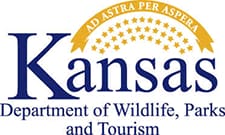

Pittsburg, KS -(Ammoland.com)- At the workshop session of the Kansas Wildlife, Parks and Tourism Commission meeting in Pittsburg June 19, commissioners worked on items for future potential regulatory action, including state park regulations, 2015 turkey hunting regulations, late migratory bird seasons, and recommendations from the Threatened and Endangered (T&E) Species Task Committee.
The T&E Task Committee recommendations are part of a regular five-year review of species on the state T&E and Species In Need of Conservation (SINC) lists. The task committee reviews the status of species on the lists and considers comments from petitioners, expert panels, scientific literature, as well as distribution and survey data.
Recommendations from the current review included delisting three endangered species; the Eskimo curlew, black-capped vireo, and many-ribbed salamander. The task committee determined that none of these species are a viable component of the state’s fauna. The committee recommended downlisting six species from threatened to SINC, including the chestnut lamprey, silverband shiner, spring peeper, smooth earth snake, and longnose snake. The recommendations also include adding the northern long-eared bat to the SINC list.
While the task committee was petitioned to downlist the redbelly snake from threatened to SINC, it recommended leaving it at the current status. However, instead of following the T&E Task Committee’s recommendations, Kansas Department of Wildlife, Parks and Tourism (KDWPT) Secretary Robin Jennison told commissioners that the department would recommend the redbelly snake be downlisted from threatened to SINC. Jennison explained that this decision was made to help ensure public support for conservation of T&E species remained strong.
“This recommendation encompasses the department’s attempt to balance the need for conservation and action identified in the expert review by our T&E Task Committee with social and economic concerns within the redbelly snake’s range,” Jennison said. “The department will use the authority already set out in regulation to establish a recovery plan for the redbelly snake as a SINC species.”
The final T&E/SINC recommendations will be voted on at the KDWPT Commission meeting in October.
In the public hearing portion of the meeting, the commission voted on public land regulations, deer season dates on Ft. Riley, and approved a recommendation that would allow hunters to hunt on the same day they purchase a big game or turkey permit. Currently, big game and turkey permits aren’t valid until the next calendar day after purchase.
KDWPT staff presented U.S. Fish and Wildlife Service frameworks and recommendations for the 2014 early teal season. Commissioners approved a 16-day season in the Low Plains Zone (east of Hwy 283), Sept. 13-28, 2014, and a 9-day season for the High Plains Zone (west of Hwy 283), Sept. 20-28, 2014.
The last public hearing item presented to the commission was necessary because of the recent addition of the lesser prairie chicken to the federal Threatened Species List. Commissioners heard and approved recommendations to adjust the Southwest Prairie Chicken Zone and close the zone to prairie chicken hunting.
Finally, Governor Sam Brownback has reappointed Commissioner Gerald Lauber to another four-year term. Commissioner Robert Wilson’s term will expire July 1, but he will serve until a replacement is named.
The next commission meeting is scheduled for Thursday, August 21, 2014 at the Kansas Wetlands Education Center, 592 NE K157 Hwy, Great Bend.
About the Kansas Department of Wildlife, Parks and Tourism (KDWPT)
Fish, wildlife and outdoor recreation are important to the quality of life for all Kansans and to the Kansas economy. As a public steward of the Kansas natural resources, the mission of the Department of Wildlife, Parks and Tourism is to: Conserve and enhance Kansas natural heritage, its wildlife and its habitats–to assure future generations the benefits of the state’s diverse, living resources; Provide the public with opportunities for the use and appreciation of the natural resources of Kansas, consistent with the conservation of those resources; Inform the public of the status of the natural resources of Kansas to promote understanding and gain assistance in achieving this mission.
About the Kansas Department of Wildlife and Parks (KDWP)
Fish, wildlife, and outdoor recreation are important to the quality of life for all Kansans and to the Kansas economy. As the public steward of the state’s natural resources, the mission of the Kansas Department of Wildlife and Parks (KDWPT) is to: conserve and enhance the state’s natural heritage, its wildlife and its habitats so future generations have the benefits of the state’s diverse living resources; provide opportunities to use and appreciate the state’s natural resources consistent with the conservation of those resources; inform the public about Kansas’ natural resources to promote understanding and support for the agency’s mission; and encourage the public to visit and travel in Kansas and stimulate tourism and travel-related spending in the state by promoting recreational, historic, cultural and natural attractions.
